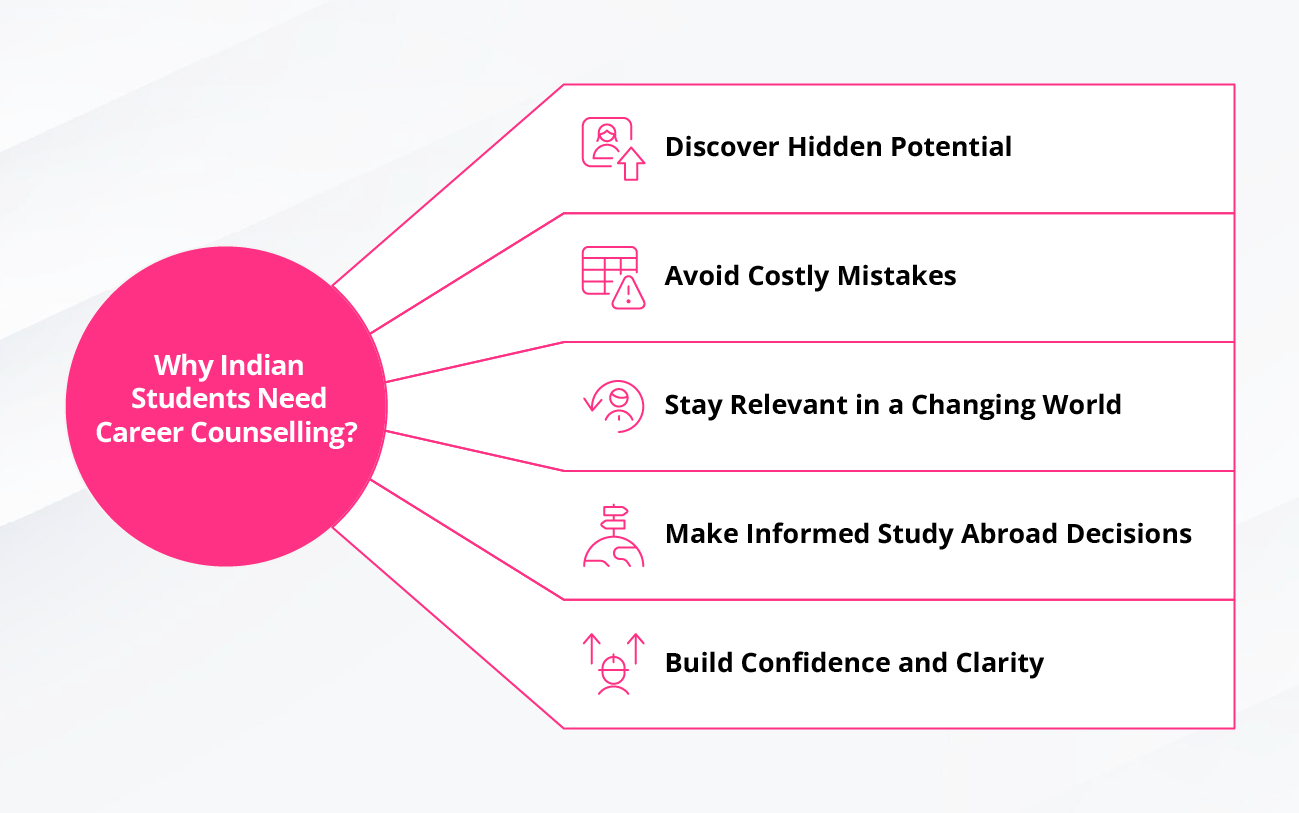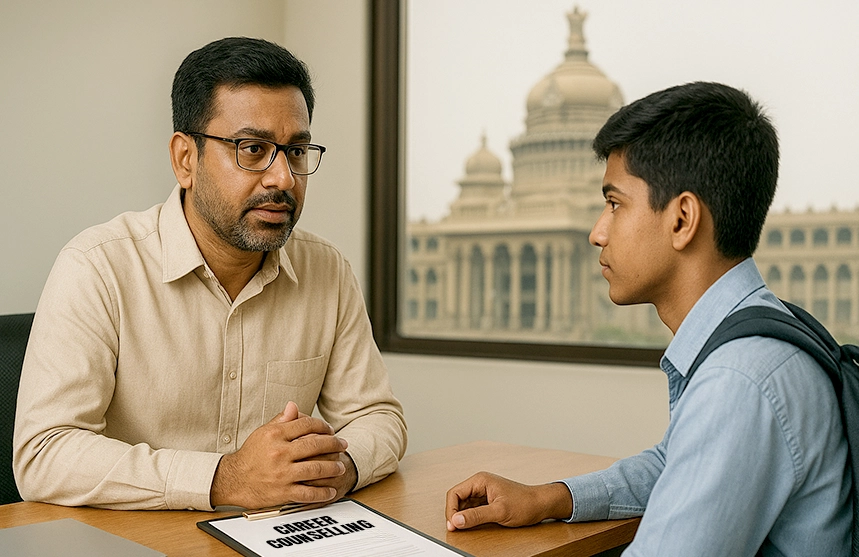Why Career Counselling Matters More than Ever for Today’s Students?
Career Counselling- Indian VS Abroad

Why Do Indian Students Prefer Studying Abroad After 12th or Graduation?
It’s not just the promise of better job prospects or higher salaries that draws Indian students abroad. One of the biggest motivators is the academic freedom and personalised support they receive—especially when it comes to choosing the right career path. Overseas, students can explore their interests freely, select subjects that align with their aspirations, and access professional Career Counselling from an early stage.
This is where India is falling short—career counselling.
In many countries, career guidance is an integral part of the school curriculum. Students receive expert advice early on, helping them identify their strengths, align their interests, and make informed decisions about their future. In contrast, Indian students often navigate their academic journey in the dark, often pressured by societal norms, parental expectations, or peer influence. By the time they truly understand their potential or passions, valuable time is lost.
In today’s blog, we’re exploring the key differences between Career Counselling in India and abroad. We’ll highlight how this lack of structured support affects Indian students—and how international students are gaining a head start on their careers, right from the school level.
Let’s dive in.
What is Career Counselling?
One of the biggest reasons Indian students miss out on the right career guidance is simply because they don’t know what career counselling actually is, when to seek it, or how it can help shape their future. Let’s break it down.
Career counselling is a structured, ongoing process that helps individuals discover their true potential by assessing their interests, strengths, and skills. With the help of tools like psychometric tests, students can gain clarity on the career paths best suited to them—and understand the steps needed to achieve their goals.
This kind of guidance can make a world of difference. Whether you’re in school or have just graduated, knowing your direction early can help you plan better, avoid unnecessary detours, and build a career that’s aligned with who you are.
As career counselling plays a crucial role in academic and professional growth, let’s look at how it creates a noticeable difference between students in India and those abroad.
Career Counselling Abroad- A Constant Support
If you have watched foreign teenage shows based on school life, you must have seen that students constantly go to the counsellors in school. With every minor or major inconvenience in their academic lives, students go to career counsellors who guide them how to get on the right track. Here is how the foreign education system integrates career counselling.
1. Included in Curriculum
In countries like the USA and UK, career counselling is a part of the school curriculum. From grade 8th onwards, students get the chance to get personalised counselling and know their true potential. Through counselling, students also get a chance to explore various programmes where they can understand different industries.
The flexibility of picking courses as per individual’s preference and getting career counselling at the early stages really help students explore as many options as possible. Through the aptitude test students get to know what they are good at, and the counsellors also guide them to attend relevant career fairs to start gaining the knowledge about the career they want in life.
2. Focus on Strengths and Interests
Career counselling abroad really helps students to know their true potential. With the help of a Psychometric Test (or an aptitude test as popularly known in the foreign land), students get to know what their interests are. With clarity and purpose, students abroad are encouraged to focus on what they’re genuinely good at and what they enjoy doing. They’re not pressured into following trends or choosing careers solely based on earning potential.
Every student has unique potential—and through proper career counselling, that potential is identified early. This gives them direction, helps them become purpose-driven, and ensures they make well-informed decisions about their future.
3. Use of Technology and Data
Career counselling abroad isn’t based on random suggestions or guesswork—it’s a data-driven process. With the help of aptitude and psychometric tests, students gain a clear understanding of their strengths, interests, and abilities.
Counsellors then use this data, along with advanced tools like AI-based profiling, to map out a personalised career path for each student. Every recommendation is backed by research and analysis, ensuring that students are guided towards the most suitable academic and professional opportunities.
4. Long-term Support
The career counselling in early stages of life help you set your future goals with ease. It is not a one-time thing, but a life-long process to make your life easier and goals achievable. Through constant career counselling, students not only navigate their school life through tough courses and thousands of opportunities, but they also earn relevant experience on the way.
The counsellors make students understand where they are lagging and how they can excel to get admission in their dream university. Besides this, they also help students in picking the right major, plan internships, build portfolio, and prepare for the job market.
While constant career counselling ease students’ journey from the early days of school life. Now, let’s see how Indian students are in big disadvantage by not having career counselling.
Career Counselling in India- The Ignored Necessity
Being an Indian student, who has never heard of career counselling, you may think how it eases your academic life. While we will shed light on that topic as well. First, let’s see how career counselling in India is an ignored necessity.
1. Late Awareness
In India, many students—and even parents—are unaware of what career counselling truly is, or that it even exists. Most students only come across the concept after completing their 12th standard, by which time they’ve already chosen a stream and may have even graduated in a field that doesn’t align with their interests or strengths.
Without proper guidance, the majority of students end up choosing Science by default, while others opt for Commerce. The Humanities stream is often dismissed as a choice for weaker students—an unfortunate and deeply ingrained stereotype. This mindset leads many young individuals to select their academic path based on external pressure, rather than personal passion.
Taking a stream under someone else’s influence is often the first step away from your true calling—and down a path that may not bring long-term fulfilment or success.
2. Parental Pressure
Career counselling is essential for Indian students because it helps ease parental pressure. One of the main factors influencing their career choices is the weight of parental expectations and societal pressure. When Indian students don’t have the freedom to pick a career of their liking, it becomes challenging for them to achieve success easily. It is an orthodox in India that career counselling is nothing but unnecessary. To help parents understand the true potential of their child and help children Find the Right Career Path, the career counsellors involved parents along with students so that all the parties can come to the same conclusion and pick what’s best for the kid.
3. Lack of Access
While foreign students get personalised career counselling at every step of their academic journey, the Indian students lack access for the same. Firstly, career counsellors are accessible to students in Tier-1 cities. Secondly, many students in Tier-2 and Tier-3 cities are not even aware of career counselling. As every student possess unique talents, they require personalised guidance at every step. This is why having career counselling in schools is so important. No matter how small a school may be, it is crucial to have career counsellors to support students at every stage. From helping them discover their true potential to guiding them as they explore various fields, counsellors play a vital role throughout the journey.
4. One Advise for All
We’ve said this countless times, and we’ll say it again—every student is unique, and so are their strengths. One piece of advice can never work for all, as each student has different interests. A common example of this is the diversity within a single class. For instance, in a class of 30 science students, 15 might be studying Biology, while the other 12 focus on Maths. This doesn’t mean every Biology student will become a doctor, nor does it mean every Maths student will become an engineer. A student’s true potential is revealed through career counselling. Unfortunately, in many Indian schools, students are not given the freedom to choose subjects they are passionate about, leaving them on the same path without fully understanding their unique abilities.
Career Counselling in India VS Abroad- A Comparison
| Aspect | India | Abroad |
|---|---|---|
| Awareness & Exposure | Low awareness, often starts late (usually Class 10–12) | High awareness, starts as early as middle school |
| Integration with Education | Career counselling is rarely part of school curriculum | Embedded into school and college systems |
| Parental Influence | High – parents often drive career decisions | Moderate – parents support but don’t dictate decisions |
| Approach to Career Choice | Based on marks, trends, family pressure | Based on interests, aptitude, personality |
| Use of Psychometric Tests | Limited and not standardised | Widely used and scientifically validated |
| Access to Counselling Services | Limited to urban areas or premium schools | Universally available across public and private institutions |
| Counsellor Training & Qualification | Many untrained counsellors or agents | Professionally certified career counsellors with psychology backgrounds |
| Student Involvement | Passive – students often follow directions | Active – students are encouraged to explore and research |
| Career Exploration Tools | Largely missing or outdated | Tech-enabled tools, AI simulations, real-world projects |
| Number of Career Options Discussed | Typically, 4–5 (doctor, engineer, lawyer, etc.) | 50+ diverse, emerging careers considered |
| Goal Planning & Roadmapping | Rarely done; no structured plans | Clear academic and career roadmaps are created |
| Counselling Duration | One-time session or during crisis | Ongoing support through school and college years |
| Outcome | Confusion, regret, wrong course selection | Clarity, purpose, higher satisfaction and performance |
| Mental Health & Confidence | Anxiety due to lack of direction | Higher confidence from being heard and supported |
| Adaptation to New Careers | Slow to adopt unconventional options | Open to niche, future-ready careers (e.g., space law, AI ethics) |
| Study Abroad Planning | Often done without career alignment | Career counsellors help choose the right course, country, and path |
| Role of Schools | Minimal or non-existent support | Schools play a direct role in guiding career paths |
| Parental Mindset | “Choose something stable” | “Choose what suits you” |
| Impact on Dropouts & Course Changes | High rate of dissatisfaction and switching | Low dropouts due to better alignment with interests |
Why Indian Students Need Career Counselling?
If you are still wondering why, you require career counselling, then here are all your reasons.

MetaApply Career Counselling- Your Go-to Advisor
Now that you have seen how big of a gap there is between Indian and abroad students’ growth years, don’t feel overwhelmed. We can understand how tough it is to aimlessly pick a career or under parent’s pressure. To ensure you get the correct guidance at every step, MetaApply Career Counselling is here to assist you. Whether you require online counselling or offline assistance, we are only one step away. Here’s how MetaApply Career Counselling works:
Step 1- Free Demo Call
When you decide to connect with MetaApply for career counselling, you get a chance to have a free introductory demo call with our expert counsellors. We understand your concerns about academics, next steps, and big life decisions; and hence, we aim to provide you with accurate counselling.
Step 2- The Psychometric Test
Once you have taken the free demo call, the next step is taking the MetaApply Psychometric Test for ₹1,999. This scientifically curated assessment will help you understand your personality traits, strengths, and interests.
Step 3- Personalised Counselling
Once you receive your psychometric test results, get in touch with our counsellors to discuss the next steps. Based on these results, our counsellors will guide you with personalised planning. We begin by helping you identify the careers best suited to you, then suggest the degrees required to pursue those careers, and finally, advise you on the subjects you should study to achieve your goals.
Step 4- Career Mapping
When it comes to find the best suited career options, we don’t randomly suggest you anything. With the help of the psychometric test result and your preferences, we help you shortlist career options based on market demand, academic requirements, job sustainability, and growth.
Step 5- Action Plan
The last step in your career counselling process is getting personalised action plan. With MetaApply Career Counselling, our counsellors set your long-term and short-term goals along with telling the skills you improve, the experiences you must have, and the courses you must pursue to achieve your goal.
Frequently Asked Questions
Foreign students have career counselling in-build in their curriculum. This means by grade 8th they can start with their counselling process and with personalised guidance they make correct career decisions. Whether it is about choosing the right college or major, the counsellors guide students at every step to help them achieve success easily.
Career counselling in India typically cost between ₹1500 to ₹20,000 based on various factors. However, if you wish to avail free career counselling, then connect with MetaApply Career Counselling. By taking the MetaApply Psychometric Test for ₹1,999, you get free career counselling for an entire academic year.
The best age to avail career counselling is 12. When you are in grade 8th, that is the best time to start with career counselling. As the early you will start the more time you will have to explore your options, pick correct stream after 10th, and make correct career choices after 12th.




















